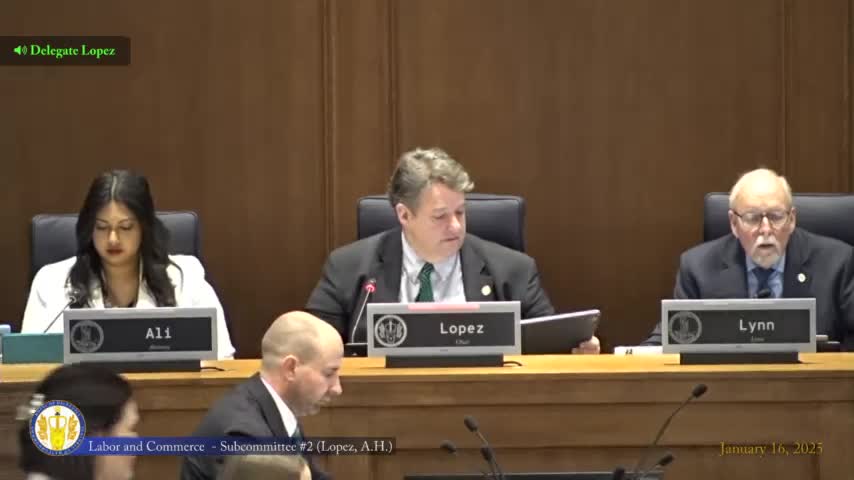Subcommittee advances Medical Debt Protection Act after divided vote

Summary
The Labor and Commerce Subcommittee 2 reported HB 17-25, the Medical Debt Protection Act (substitute), by a 5-2 vote after testimony from patient advocates, health organizations and hospital and creditor groups. The bill would limit interest and certain collection practices on medical debt and require affordable payment plans.
House Bill 17-25, the Medical Debt Protection Act, was reported by the Virginia House Labor and Commerce Subcommittee 2 on a 5-2 vote after a hearing that drew patient advocates, health-care organizations and creditor groups.
Delegate L. Delaney, the bill’s patron, presented the substitute and said the measure “prevents interest or late fees on medical debt and requires payment plans to be offered and that they follow certain criteria.” The substitute also relies on the IRS list of “extraordinary collection actions” to define prohibited collection practices and removes duplicative provisions that the General Assembly adopted in prior legislation on reporting medical debt.
The bill would: prohibit charging interest or late fees on medical debt; require that offered payment plans not exceed 5% of a patient’s gross monthly income and not begin until at least 90 days after care is provided; bar certain fees (service and administration); require notice to patients and the return of excess payments if a patient later qualifies for financial assistance; prohibit sales of medical debt while a health-care appeal is pending (with a 60-day limit measured after the appeal review); and make debt recallable if an individual becomes eligible for financial assistance.
Supporters including Lauren Edwards of the Leukemia & Lymphoma Society, Amanda Gago Silcox of the Virginia Poverty Law Center and Jared Calfee of AARP Virginia said medical debt differs from other consumer debt and can follow patients for years, jeopardizing housing, credit and long-term financial stability. “Medical debt is different than consumer debt and we should treat it that way,” Lauren Edwards told the subcommittee. Advocates argued the bill would reduce the long-term harms that patients face after major illness or emergency care.
Opponents raised concerns about conflicts with existing law and potential preemption or litigation risk. Brent Rawlings of the Virginia Hospital and Healthcare Association said the bill “conflicts with existing law,” citing current code section 32.1‑137.09 and noting differences on interest, who must be offered payment plans, and timing. Matt Benedetti of the Virginia Creditors Bar Association said his group had not had time to fully digest the substitute. Fred Helm of the Consumer Data Industry Association told the panel the issue is currently the subject of federal litigation over preemption.
Committee members asked about enforcement and whether violations would be handled under the state’s consumer protection statute; Delegate Delaney answered that violations would be enforceable under that statute and subject to its penalties. The sponsor also described the substitute as a technical clean-up that consolidates and relies on the IRS definitions of “extraordinary collection actions” rather than repeating the list verbatim.
After public testimony and brief committee discussion, a subcommittee member moved to report the bill. The motion to report the substitute passed 5-2. The subcommittee recorded the vote and sent the bill forward for further consideration.
Votes at a glance for this bill: the substitute was reported by a recorded roll of 5 in favor, 2 opposed. The motion was to report with the substitute; the record does not show named movers or seconders in the transcript.
The bill now goes to the next committee step identified by the Rules of the House for further review (the transcript recorded it as reported by the subcommittee).

